
The Journey of Georgian Winemakers - “There Is No Alternative to the Western Market”

Russia was once the number-one export destination for Georgian winemakers. Although trade ties between Georgia and its nemesis, its northern neighbour have grown closer again following the war in Ukraine, a number of high-quality wine producers in Georgia have never contemplated the idea of exporting their wines to Russia.
In March 2023, when protests against the „foreign agents“ law in the Georgian capital of Tbilisi seized international attention, the image of a woman holding the EU flag made its way through countless media outlets worldwide. The woman in this viral photo was Nana Malashkhia.
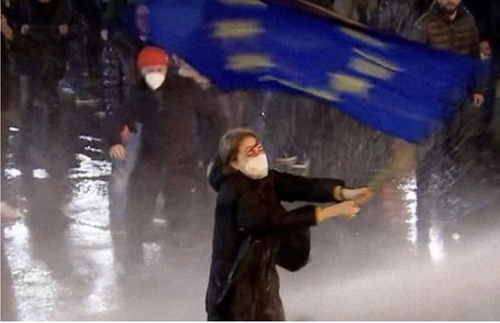
But Nana wasn't alone in this powerful scene. There was a man beside her, wearing a red hat. He supported Nana's back and prevented her from being swept away by the forceful water cannon waves. His name is Levan Kamushadze, a young winemaker from Georgia who actively participates in anti-Russian protests.
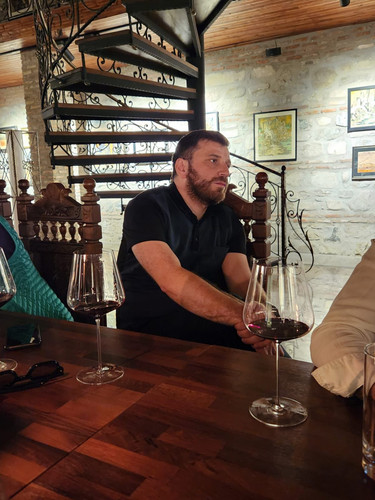
“Russia is an occupant, and this is why I have protested”, Levan says in the interview with Caucasus Watch. For Levan, making wine has been a family tradition for many years, but he decided to take it professionally three years ago. As he takes the first steps, Levan already has a clear idea of how his business will develop.“As a young person, I don't think about the Russian market. I want to sell my wine in Europe because Europeans will understand the uniqueness of Georgian wine", he says. Although it’s quite challenging to reach the European market, he is making a significant financial investment to comply with Europe's quality standards and has already found partners in Germany. “This is why I'm travelling to Germany now. They tried my wine and liked it. I also had a visitor from the USA, and he liked my winery a lot. I plan to sell it in Colorado as well", Levan says.
Known as the cradle of wine, Georgia boasts an array of over 500 grape varieties, and interest in them has always been high. Georgia was historically home to one of the earliest known winemaking cultures. Ancient burial sites in Georgia have revealed evidence of grape cultivation, and UNESCO added the traditional Georgian method of making wine (Qvevri Method) to its list of Intangible Cultural Heritage.
However, Russia has been the primary destination for Georgian winemakers for many years. With its proximity, convenient regulations, and almost no quality requirements, it seemed like a natural choice. Back in 2006, when Russia placed an embargo on Georgian wine, the industry was almost completely dependent on the Russian market. This resulted in severe losses, and since then, wine companies have avoided the risk of dependence on an unstable and unpredictable Russian market and started establishing themselves on the EU and American markets. However, trade ties between Georgia and Russia have strengthened again following the war in Ukraine. Russian media reported in June that Georgia became the country's top still wine importer. In the first five months of 2023, Georgian supply increased by 63% year-on-year, overtaking Italy and Spain. The data from Georgia’s National Statistics Office also suggests that wine exports to Russia increased from 17000 to 25000 metric tonnes in the first five months of 2023 over last year's same period.
The latest data show that Russia's share of Georgian wine exports is 66.7%, maintaining the top spot. After more than a decade of steady growth, for the first time since 2009, wine exports to the European Union dropped by 10.4%. However, Poland, Germany, Latvia, and Lietuva (Lithuania) continue to be popular destinations for Georgian wine.
Georgian economist Soso Berikashvili says that historically, the Russian market has always been popular among Georgian winemakers for a few reasons. “Because it's easy to export, it's close. There are almost no requirements regarding quality. Georgian wine producers know the language, and they know what Russian consumers need”, he says. Berikashvili points out that nothing specific has happened following the war in Ukraine that could increase wine exports to Russia. “It is just possible that some of these flows could no longer be exported to Ukraine and moved to Russia. Although we do not rely on them as much as we did before the embargo in 2006, Russia still accounts for a large share of our exports. This dependence is constantly increasing, and this is a problem,” he says.
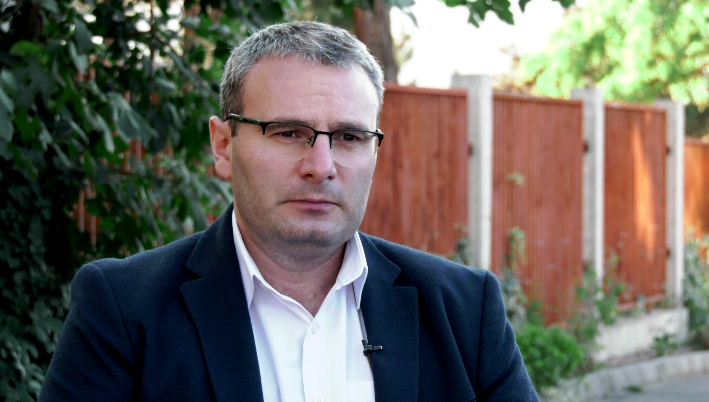
Up to 40 women wine makers who are united in the association called Women in Wine Industry, have never contemplated the idea of exporting their wines to Russia. The founder of the association, Manana Akhvlediani, says that many winemakers encounter difficulties when it comes to the wine-making process, exporting, documents, and quality standards. Founded in 2020, the association's mission is to help those in need.“We are not interested in the Russian market, it is not suitable for small wineries. Politics is one thing, but the market is chaotic, there is no stability. Besides this, Russia is the cheapest wine market, they need very cheap wines. Wineries like us do not have cheap wines”, says Manana Akvlediani.
Over the last few months, Georgian women from the association have presented their wines in several countries, including Poland and the United Kingdom. Seven winemakers have already begun exporting to Poland. In the near future, Manana hopes to sell their wines in England too.“European countries are the most significant markets for small wineries. In Poland, Georgian wine is well known and sells well. The English market is also very important, there is a high demand for exclusive wines,” Akhvlediani says. “Additionally, we are interested in the Japanese market, which is a good place for natural and organic wines. Our plan is to hold an exhibition in Japan. There is also great interest in Qvevri wine in America. Our goal is to present our wines there next year”.
Often, reaching American and European markets and meeting their quality standards is anything but easy. A number of Georgian winemakers have spent years in the wine industry but have not been able to make any profit. Iago Bitarishvili began making wine in 2003 and was the first to receive a biocertificate in Georgia in 2005. Iago produces 7 000 – 8 000 bottles of white dried natural wines each year and exports them to 11 countries, including the USA, Japan, and Europe. But he had to go through a long and arduous journey until now.
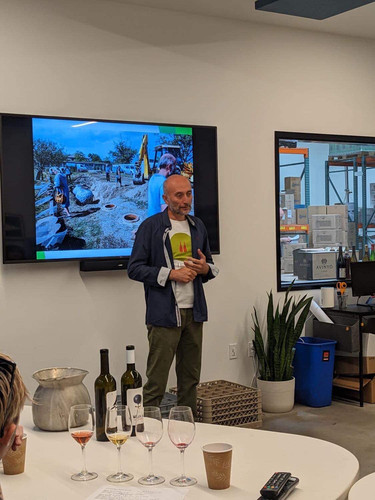
"Over ten years, I didn't make any money from this winery. We invested everything that came in, including our salaries,” he says. As Iago points out, there are now more opportunities for young winemakers compared to 15 -16 years ago, when he was starting to export wine to Italy. At that time, he hadn't been abroad and didn't speak a foreign language.“We couldn't have done it without the love of vineyards and wine. We often say that, for Georgians, this is all part of our identity. I still don't know how profitable it is now but I do not complain”, Iago told Caucasus Watch. “We have nothing left from previous generations, so it is natural that we face so many difficulties as we take the first steps. But we can leave more for future generations so that they can continue and develop it”.
Iago believes that the market dictates a great deal to the producer, mentally, qualitatively, and in terms of business development as well.“What are the advantages of the Western market for me? The experience gave me a great deal of knowledge. Those of us who sell wine on the Western market grew up together. Without the Western market, without sharing experiences with local winemakers and international buyers, and without business relations, I am certain that I would have been in a completely different position. There is no alternative to the Western market if you want your business to be future-oriented,” Iago says.
Although European and American quality standards are often challenging to meet for Georgian winemakers, many economists in Georgia believe that this supports developing the local wine sector. According to economist Soso Berikashvili, it allows Georgians to produce better and more expensive wines.“There is no way Georgian wine can compete with big wine producers. Our future lies in niche wines. It is crucial that the wine sector develop, and get access to better markets, even though entry requirements and consumer demands are high. We need to produce in small quantities and with high quality. For this reason, Europe, America, and, in general, the developed countries are very significant markets for us,” says Berikashvili.
Contributed by Khatia Shamanauri, a freelance journalist from Georgia.
See Also

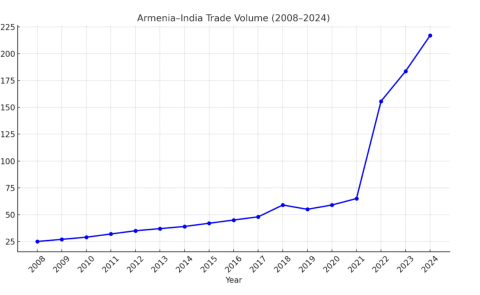
Armenia and India: Building New Bridges in Trade and Strategy

Between Tehran and Tel Aviv: Azerbaijan’s Neutrality Dilemma Amid Rising U.S.-Israel Tensions with Iran

From Neorealism to Neoliberalism: Armenia’s Strategic Pivot in Foreign Policy After the Nagorno-Karabakh Conflict

Georgia and Russia: New Turn in Bilateral Relations

